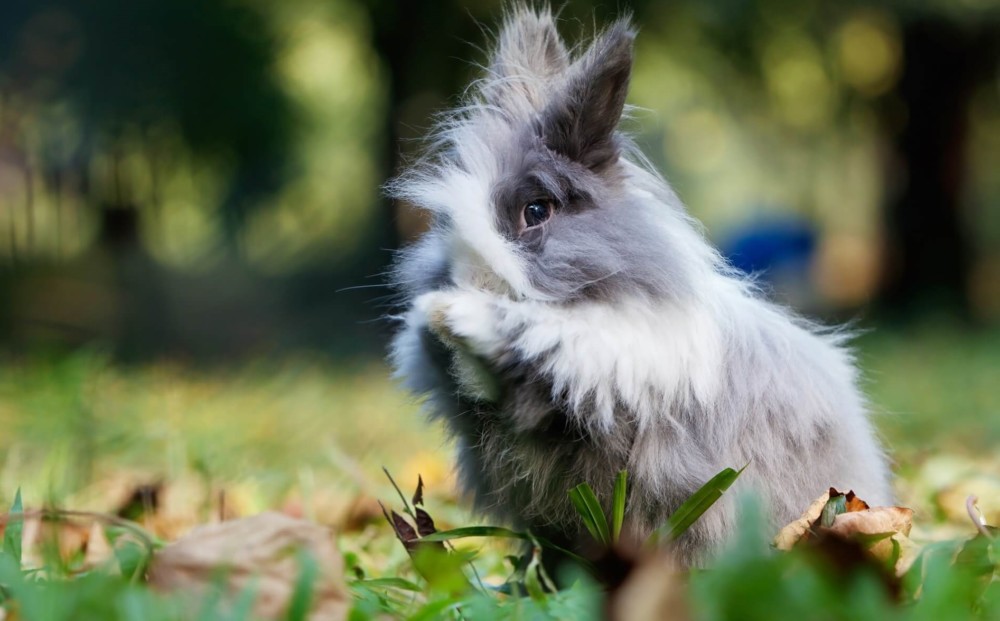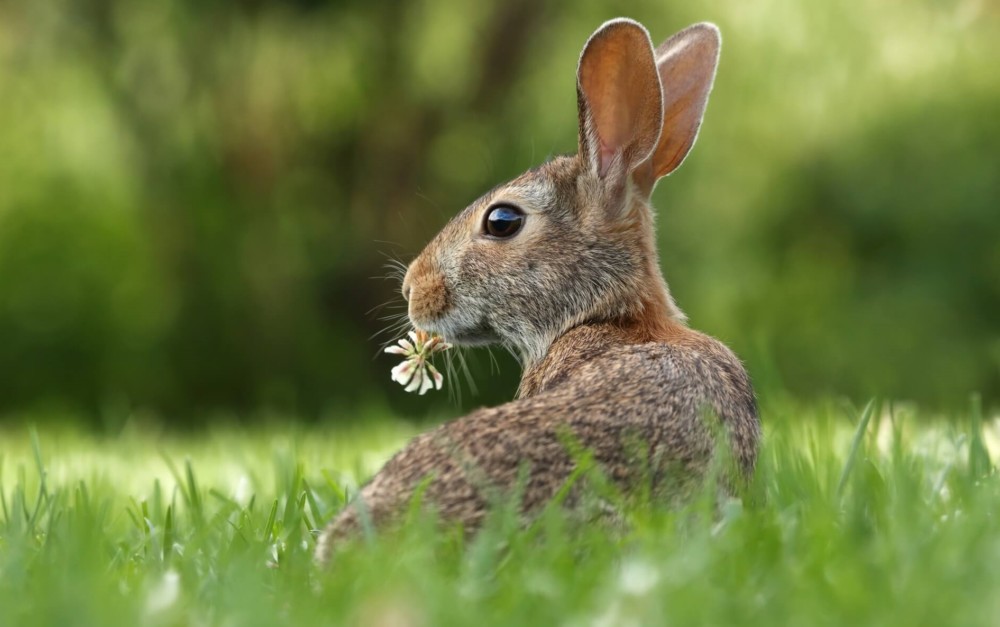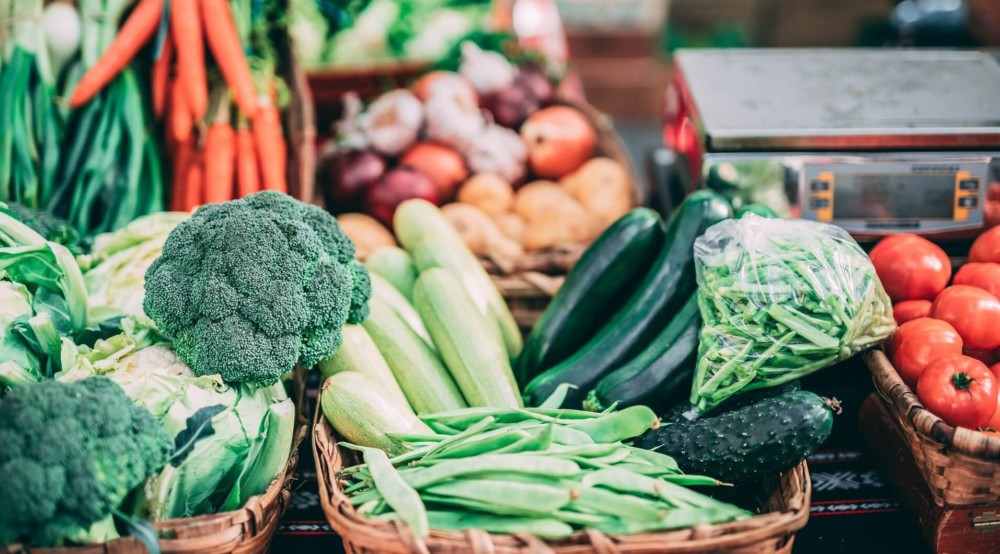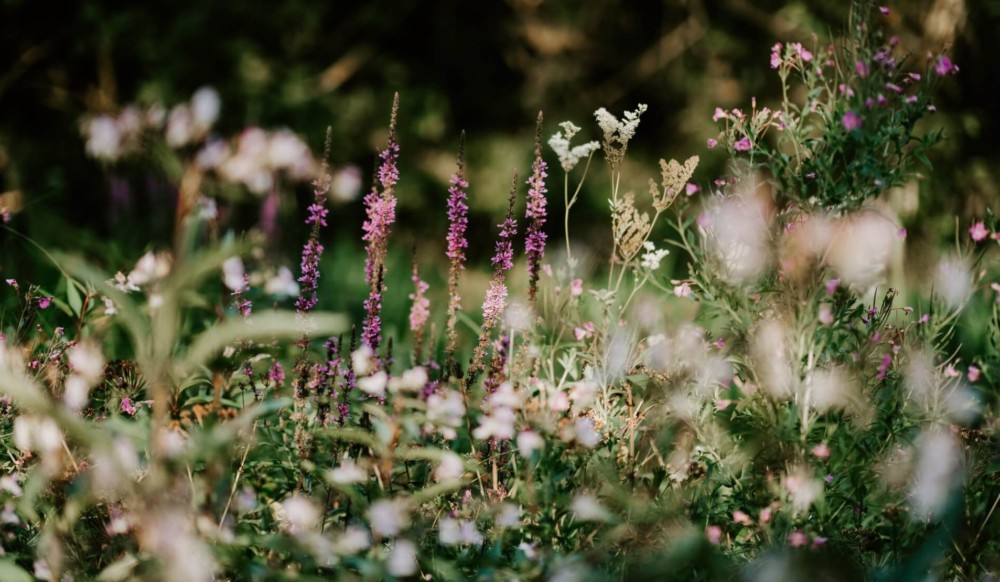Whether you are raising rabbits as pets or as part of your homestead, it’s important to feed rabbits a healthy diet. It’s easy to assume that anything that’s healthy for people is also healthy for rabbits, but that isn’t the case.
What do rabbits eat? Rabbits are herbivores. They will eat a wide variety of hay and grass, vegetables, and limited quantities of fruits. There are also many wildflowers and plants rabbits can healthily eat. They should never eat animal products or products made from animal production.
This is important!
Rabbits have a very different digestive system than people do. Unlike people, rabbits don’t have the ability to throw up something that is poisonous or bad for them.
Anything they eat, they have to push through their system. As a result, it is important that they eat foods that are high in nutrients and fiber.
Many of the foods that are ideal for rabbits are boring or tasteless to people. And, many of the veggies and fruits that people love are actually bad for rabbits in high quantities.
Did you know?
Rabbits have very sensitive taste buds. They love flavors!
As a result, rabbits will usually eat almost anything, even if it’s bad for them. They simply enjoy the various flavors and will consume bad foods.
Key Info About Rabbit’s Digestive System
Rabbits have unique digestive systems. Their digestive systems are very efficient and contain several aspects that people’s digestive systems don’t.
As a result, they can get a lot of nutrients out of foods, such as hay, that wouldn’t nutritionally help a person.
Inside their digestive system, they have a cecum, which almost functions as a second stomach. When food goes through their digestive system, the smaller particles pass through and the larger particles go into the cecum.
The cecum has special bacteria that help to further break down the food and pull out the nutrients.
Why does my rabbit eat its poop? It may appear that rabbits eat their poop, but in reality, they are actually eating their cecotropes. Cecotropes are expelled from rabbits as soft black droppings and are different from the little black droppings they also expel.
Cecotropes are important to a rabbit’s digestive health by keeping the food moving through and by helping their digestive system utilize all of the nutrients in their food.
When a rabbit eats a food that isn’t good for it, or is high in sugar, the cecotropes digest through the cecum. This causes an excess of bacteria to be used to digest it and the poop becomes soft.
Did you know?
Soft rabbit poop is a sure sign of an improper diet and one of the first signs your rabbit is headed for poor health.
If your rabbit has soft poop, return to its previous diet of high hay and forgo any new foods until the poop has returned to hard and dry poop.
How To Introduce New Foods
Rabbits can eat a large variety of fresh foods, but they should not be started on new foods until the bunnies are at least 3 months old or digestive issues can occur.
Adult rabbits should only be introduced to a single new food in a 24 hour period. This will allow you to monitor their stool and how the rabbit reacts to the food.
- Wait until rabbits are fully-grown, about 3 months old to introduce new foods
- Only introduce new foods every 24 hours at the most
Types of Hay that Rabbits love and are good for them
Hay is the single most important food for rabbits. In addition to using it for bedding, rabbits need constant access to hay for food.
Why is hay so important to rabbits? Hay provides the fiber that rabbits need to keep food moving through their systems. Rabbits groom themselves all day long and as a result, they swallow a lot of hair. Hay helps to push the hair through their systems so they don’t get balls of hair that block their system and cause major issues.
Rabbits need a lot of fiber for good health. They need a lot more fiber than people need. It is critical to them.
There are many types of hay and not all of them are good for rabbits.
Alfalfa hay should be avoided for most rabbits. Young rabbits can eat alfalfa, but adult rabbits should not consume alfalfa because of its high sugar content. It also has a high protein content, which isn’t good for adult rabbits.
Did you know?
Alfalfa isn’t actually hay! It’s a legume. That’s why it’s nutritional content is so different from other types of hay.
What types of hay are best for rabbits?
Timothy hay, grass, oat hays, and brome are all great hays for rabbits. You can purchase these hays from animal feed stores or buy them directly from a farmer in your area.
If you have little patches of land on your homestead, plant some of these hays in those patches and use it to feed your rabbits.
Another benefit of hay is that it helps to wear down their teeth. Rabbits have teeth that grow continually. If they don’t trim their teeth on the foods they will get overgrown teeth. Hay plays a major role in wearing down their teeth.
But,
Never feed rabbits moldy hay. It can cause major health issues.
To recap, hay provides the following benefits to rabbits.
- Helps to move fur and other non-edibles through their system healthily
- Has low sugar, but high in rabbit-nutrients
- Provides fiber needed
- Helps to wear down their teeth
- No moldy hay
What about rabbit pellets? Rabbits can eat pellets, but should be limited in the quantity of pellets they eat each day. Pellets can quickly cause rabbits to become overweight.
A 5 lb rabbit should not eat more than ¼ cup of pellets a day.
Did you know?
Rabbits should only eat timothy pellets. The “rabbit pellets” sold in feed stores aren’t actually good for rabbits. They usually have extra “treats” mixed in such as oats, sunflowers, and other things not healthy for rabbits.
These types of pellets appeal to human owners because they look healthy, but they aren’t healthy for rabbits.
Avoid them.
- Only feed rabbits a small handful of timothy pellets each day. No more.
Vegetables That Rabbits Can Eat
Fresh food is healthy for rabbits to eat and helps to provide them with additional water that helps their bladder and kidneys. Fresh foods also provide additional texture, taste, and nutrients to a rabbit’s diet.
Of all the fresh foods, you feed your rabbit, most of it, about 75%, should be leafy greens. Choose greens that are dark in color and so will be high in nutrients. Avoid pale lettuces and greens as they won’t do much for your rabbit’s health.
Rabbits can eat 1 cup of leafy greens per every 2-4 lbs of body weight each day.
What types of leafy greens can rabbits eat? Rabbits can eat a variety of leafy greens, including ones that people don’t normally eat. These include artichoke leaves, bok choy, the leaves of cauliflower, collard greens, endive, kale, radish leaves, pea leaves, and okra.
- Artichoke leaves
- Bok Choy
- Cauliflower leaves
- Collard Greens
- Endive
- Kale
- Radish leaves
- Pea Leaves
- Okra
What types of lettuces can rabbits eat? Most lettuce is good for rabbits, except pale lettuce such as iceberg or crisphead lettuce. Rabbits can eat spring lettuces, romaine, red lettuce, and dark green lettuces.
- Romaine lettuce
- Green Lettuce
- Red Leaf Lettuce
Some people recommend limiting the amount of kale that a rabbit eats because they think it has high amounts of oxalic acid, but kale actually has less oxalic acid than other foods.
Spinach, mustard greens, and parsley have high levels of oxalic in them and should be fed sparingly to your rabbit.
Vegetables That Rabbits Can Healthily Eat:
There are many other vegetables that rabbits can eat and that is good for them. Other non-leafy greens should be fed in smaller quantities because of their higher sugars and starches. Feed rabbits about 1 TBS, per 2 lbs of body weight, of other vegetables a day.
- Artichoke leaves
- Sweet corns: baby-sized, not fully grown
- Cauliflower and leaves
- Celeriac
- Celery
- Chicory
- Courgette and flowers
- Cucumber
- Fennel
- Green beans
- Kohlrabi
- Okra
- Peas: leaves and pods
- Peppers: green, yellow, red, orange
- Pumpkin
- Radicchio
- Rocket or Arugula
- Squash
- Swede
- Sunflower seeds
- Watercress
- Wheatgrass
- Zucchini
Veggies Rabbits Should Be Very Limited Eating
Some veggies can cause digestive issues with rabbits. Many of these vegetables should be fed only once or twice a week.
But,
It’s even better to rotate these veggies with other limited veggies over the course of several weeks. If you feed your rabbit parsley in a week, wait another couple of weeks to feed parsley again.
This will help to avoid digestive and other health issues.
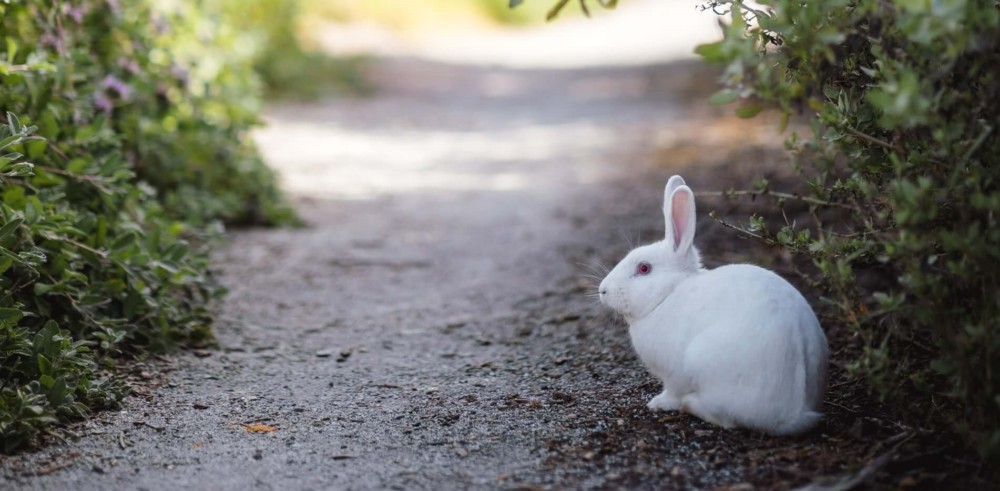
Feed these vegetables in limited quantities to rabbits:
- Broccoli: Both the purple and green varieties are good. Avoid the stems and the tops as they cause gas in rabbits.
- Beetroot: Limit the leafy tops, which have a lot of oxalic acid and can be toxic in high quantities. Beetroot can also cause gassiness.
- Brussel Sprouts: Feed the leaves and sprouts. It can cause gas.
- Cabbage: Causes gas and can cause other digestive upsets.
- Carrots: Rabbits can eat the carrots and the tops. Carrots have a high sugar content and should be very limited as a treat.
- Chard
- Radish tops: The tops can cause gas.
- Spinach: Is high in Oxalic acid and should only be fed occasionally.
- Turnip: Only feed to rabbits occasionally.
Herbs That Rabbits Can Eat
Although we tend to itemize herbs as a different type of food, in reality, many herbs are actually more like leafy greens for rabbits. There are a number of fresh herbs rabbits can eat and will greatly enjoy.
These herbs include:
- Basil
- Coriander, also known as cilantro
- Dill
- Mint and peppermint: Rabbits may avoid from the strong flavor
- Parsley: Feed sparingly
- Oregano
- Rosemary: Rabbits may avoid it from the strong scent
- Sage
- Thyme
- Watercress
Fruits That Rabbits Can Eat
All fruits should be fed in very limited quantities because of their high sugar content. Too much fruit will cause their stool to go soft and will throw the good bacteria in their digestive systems out of whack.
It will also cause your rabbits to become overweight, which causes a plethora of other health issues.
Limiting quantities of fruit would be providing a small slice of an apple instead of a half an apple to your rabbit. It could include a slice or two of carrots instead of an entire carrot.
Never feed your rabbit more than 2 TBS of fruit a day, It’s even better if you limit fruits to 1 TBS or less per day.
Rabbits will overeat the sweet fruits so you really need to limit their intake.
Never!
Feed rabbits the hard seeds inside of the fruit. Nearly all these hard seeds are poisonous to rabbits. The ones that aren’t are very hard to digest and can clog their systems.
Fruit that is ok for rabbits to eat:
- Apples
- Apricot
- Bananas: High in potassium
- Blackberries: Even the leaves are edible. They provide great astringent properties.
- Blueberries
- Cherries: Never feed the leaves or other parts of the tree.
- Grapes
- Kiwi fruit
- Mango
- Melon
- Nectarines
- orange
- Papaya
- Peaches
- Pears
- Pineapple
- Plums
- Raspberries: Leaves are edible. It provides astringent properties.
- Strawberries: Leaves are edible.
- Tomatoes: Leaves are poisonous. Do not feed them to rabbits.
- Watermelons
Wild Plants Rabbits Love To Eat
In addition to the typical foods, rabbits also love to eat many plants found in the wild. Most of the world’s rabbits are wild rabbits and they get nutrition from a wide variety of plants.
If you are homesteading rabbit colonies and raising them outside, these plants are great plants to make available to your rabbits:
- Borage
- Calendula (flower)
- Camomile
- Chickweed: is a great astringent
- Clover: both the leaves and flowers
- Coltsfoot
- Comfrey
- Cow parsnip
- Dandelion: Has great diuretic properties.
- Daylily (flower)
- Dianthus (flower)
- English daisy (flower)
- Hibiscus (flower)
- Honeysuckle (flower)
- Goosegrass
- Lavender
- Knapweed
- Marigold (flower)
- Mallow
- Nasturtium (flower)
- Nettle
- Nasturtium leaves and flowers
- Pansy (flower)
- Plantain
- Rose (flower)
- Shepherd’s purse
- Sow Thistle
Poisonous Plants To Rabbits
There are a number of plants that are poisonous to rabbits. Avoid having these plants where your rabbits can eat them or gain access to them.
- All bulb plants
- Amaryllis
- Arum lily, also known as cuckoo point
- Avocados
- Bindweed
- Bracken
- Bryony
- Buttercup: small quantities ok
- Convolvulus Bindweed
- Deadly nightshade, also known as Belladonna
- Delphinium Larkspur
- Elder
- Fools parsley
- Foxglove
- Helleborus, also known as Christmas rose
- Hemlock
- Henbane
- Lily of the valley
- Lupin
- Laburnum
- Most evergreens
- Oak leaves
- Plants in the onion family
- Poppies
- Potato plants
- Privet
- Ragwort
- Rhubarb leaves
- Scarlet runner toadflax
- Woody nightshade
- Yew
In addition to these plants, there are other foods that rabbits should never eat. Never feed rabbits chocolate as it’s poisonous to them.
Plus, any refined human food, manufactured foods, and foods high in carbs are bad for rabbits. This includes bread, crackers, cookies, pasta, cereal, chips, and other carb foods. Never feed rabbits milk products such as yogurt or other milk-foods.
In addition, rabbits should never eat potatoes, beans, seeds, nuts, or fully ripe corn.
Frequently Asked Questions
What do rabbits eat in the wild? Rabbits eat roots, leaves, grass, and a wide variety of plants in the wild. Wild rabbits can survive in very desolate areas without a lot of greenery and their efficient digestive tract helps them get all the nutrients available out of the food they can find. But, this doesn’t mean wild rabbits are as healthy as domesticated rabbits because they may not always find the best balance of plants and hay to keep them at optimal health.
What flowers do rabbits not eat? Rabbits generally won’t eat bulb flowers, astilbe, marigolds, snapdragons, primrose, and peonies. Other
What plants do rabbits generally not eat? Rabbits will generally avoid plants that have a rough texture such as all pine trees, prickly plants, and smelly bushes. This includes yarrow, bee balm, holly, currant, lavender, rosemary, agave, and other pungent plants.
Related Articles
You might also find these articles helpful.
How To Raise Rabbits: The Complete Guide With Photos
Most Profitable Farm Animals For A Small Farm
8 Kid Friendly Farm Animals That Make The Best Pets
Recommended Rabbit Supplies
This list contains affiliate products. Affiliate products do not cost more but helps to support BestFarmAnimals and our goal to provide farm animal owners with accurate and helpful information.
Housing: If your rabbit is indoor, you’ll need a cage, a hideout (to keep your rabbit from death by heart attack), and a space for it to get exercise and spend time with you. If you don’t want to let it run free in your house, this animal playpen provides space and keeps your rabbit from hiding under your couch.
If you keep your rabbit outdoors, an outdoor hutch that provides space and protection from predators is needed. (I’d still keep mine in a barn for further protection from the elements.)
You’ll also need bedding, toys, a grooming brush, and treats for your little friend. A litter box is important because rabbits can be potty trained. Timothy hay is the best kind of hay for rabbits as alfalfa is too sweet. Don’t forget a water drinker. I like the half-gallon waterer because it can cover two rabbits for several days. Pair it with a food bowl or a food manger (a little cleaner) and you’ll be set up!
If you want to treat your bunny to entertainment, a cat tower, a treat ball, or bunny toys all work wonderfully.
Finally, if you plan on taking your rabbit with you on trips, you’ll need a carrier. Here’s a small carrier or larger carrier that work great for occasional travel. If you travel a lot, you might want the carrier that’s rated #1 in safety for safe travels
Lastly, I use this odor eliminator for accidents and to wipe out the bottom of the cage and litter box when I clean it.

